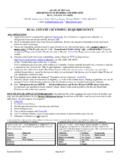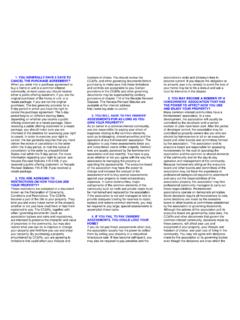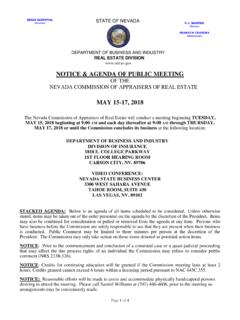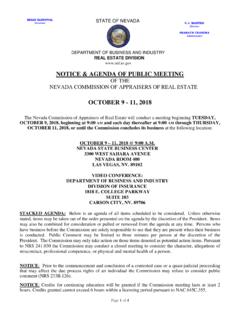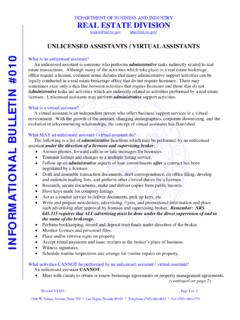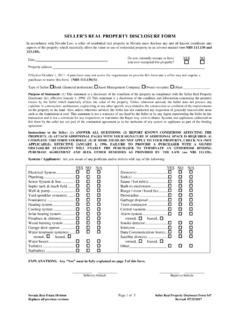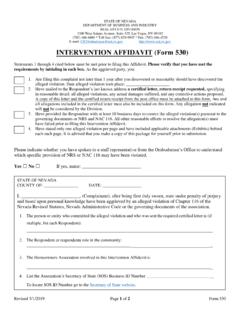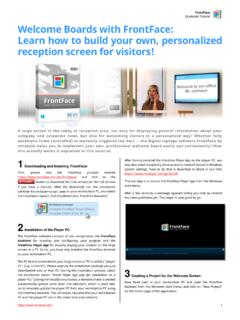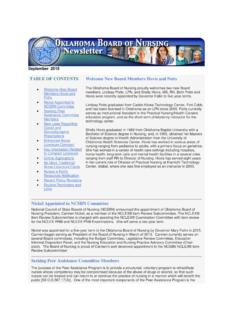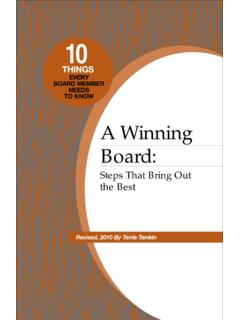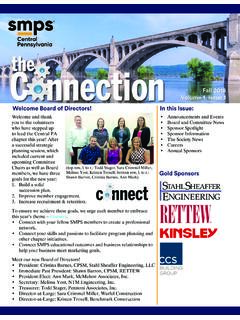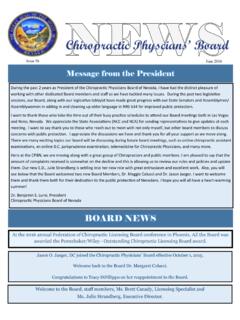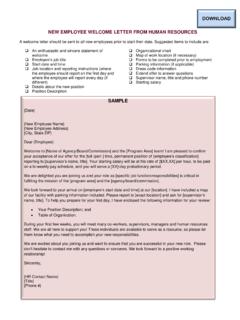Transcription of WELCOME TO YOUR HOA’S BOARD OF DIRECTORS
1 WELCOME to the BOARD NEVADA REAL ESTATE DIVISION. PR ESEN T ED BY TH E TR AIN IN G OFFIC ER FOR TH E OFFIC E OF TH E. O MBU D SMAN ; C O M M ON -INT EREST C O M M UN IT IES AN D. C O N D OMINIUM H O T EL S PR O G R AM. First Steps Congratulations! You have been elected to your association's BOARD of DIRECTORS and have been assigned your officer position. Let's discuss some important first steps. 2. First Steps - Taking Office In your candidacy statement, you made a good faith effort and were honest in disclosing: Whether you are in good standing, meaning that you do not have any unpaid, past due assessments or construction penalties due to the association; and Any financial, business, professional or personal relationship that could result in a potential conflict of interest, meaning that you stand to gain any profit or compensation of any kind from the association. If you stand to gain money from the association, you cannot be on the BOARD .
2 NRS (9). 3. First Steps Governing Documents Executive BOARD members must read and understand the association's governing documents (declaration of CC&Rs, articles, bylaws, and any rules created for clarification). The association may adopt and amend rules and regulations without approval of the unit owners. NRS 4. First Steps NRS 116. Nevada Revised Statutes (NRS) 116 contains the statutes that regulate the association. Become familiar with NRS 116, have the statutes handy, and refer to them often. NRS 116 is available free of charge on the legislative website: 5. First Steps NAC 116. Executive BOARD members must also be familiar with Nevada Administrative Code (NAC) 116. NAC 116 contains the administrative code that works in conjunction with NRS 116 to explain how the association must comply with the law. 6. First Steps . Management Agreement If your association has a Community Manager, read and understand the management agreement.
3 NRS (4) Within 30 days after an election or appointment of a new member to the executive BOARD , the community manager shall provide the new member with a copy of the management agreement. 7. First Steps Form 602. Declaration of Certification Common- Interest Community Executive BOARD Member/Form 602 must be completed within 90 days of taking office and maintained as an association record. The form is available online at: *Do not submit this form to the Division unless requested. 8. Fiduciary Duty Executive BOARD members are expected to act: o On an informed basis o In good faith o In the honest belief that their actions are in the best interest of the association NRS 9. Voting by BOARD Members The purpose of DIRECTORS serving on the BOARD is to cast votes in meetings that result in decisions being made for the association. A member of an executive BOARD who stands to gain any personal profit or compensation of any kind from a matter before the BOARD cannot vote on the matter and should not serve on the BOARD .
4 If the member does not resign, he or she can be removed, at a BOARD meeting, by the majority of the BOARD pursuant to NRS. (10)(a)(2) & NRS (13)(b). A member of an executive BOARD who has a family member or friend (not a live-in spouse) who stands to gain any personal profit or compensation of any kind from a matter before the executive BOARD shall disclose the matter to the executive BOARD before voting on any such matter (NRS ). 10. In performing their respective duties, DIRECTORS and officers are to: Rely on information, opinions, reports, books of account or Making Informed Decisions statements presented by professionals reasonably believed to be reliable and who exhibit expert competence. NRS 11. Solicitation of Bids IF an association solicits bids for an association project at all, the association must, whenever reasonably possible, solicit at least 3 bids. This is true especially if the project is expected to cost: 3% + of the annual budget (in a community of 1,000 units or less).
5 Or 1% + of the annual budget (in a community of 1,000 units or more). Association project includes a project that involves: The maintenance, repair, replacement or restoration of any part of the common elements, or Using professional services like accounting, engineering, legal, etc. Sealed bids must be obtained from reputable service providers who possess proper licensing, and must be opened and read aloud during a regular meeting of the executive BOARD . NRS 12. Enforcing the Rules If any provision of the governing documents is violated, the executive BOARD may, if the governing documents so provide: Prohibit, for a reasonable time, the unit owner from voting on a matter related to the community and using the common elements (excluding prohibiting ingress/egress/parking); and Impose a fine (as described in the fine schedule). If the violation poses an imminent threat to health, safety or welfare, the amount of the fine must match the severity of the violation.
6 If the violation does not pose such a threat, the amount of the fine must still match the severity of the violation and must not exceed $ NRS 13. The executive BOARD may not impose a fine unless: a) At least 30 days before the alleged violation, the violator had been provided with applicable provisions of the governing documents (unless changes have been made to the governing documents, the resale package received by the unit owner at the time of purchase is sufficient); and b) The violator received written notice by mail following the violation: Specifying in detail the alleged violation, including the provision violated, Providing a clear and detailed photograph of the alleged violation (when possible), Providing a reasonable opportunity to cure the alleged violation, Providing the amount of the potential fine, and Providing the date, time, and location for a hearing to contest the alleged violation and fine.
7 The executive BOARD must schedule the date, time and location for the hearing on the alleged violation so that the unit's owner and, if different, the person against whom the fine will be imposed is provided with a reasonable opportunity to prepare for the hearing and to be present at the hearing. 14. Fines, Continued If a fine is imposed and the violation is not cured within 14. days, or any longer period established by the BOARD , the violation shall be deemed a continuing violation.. Thereafter, the executive BOARD may impose an additional fine for the violation for each 7-day period, or portion thereof, that the violation is not cured. Any additional fine may be imposed without providing notice and an opportunity to be heard. A member of the executive BOARD shall not participate in any hearing or cast any vote relating to a fine if the member has not paid all assessments. Any past due fine must not bear interest.
8 15. Retaliation An executive BOARD , a member of the BOARD , a community manager or an officer, employee or agent of an association shall not take, or direct or encourage another person to take, any retaliatory action against a unit's owner because he or she: Complained;. Made business recommendations; or Requested to review records. Upon willful violation of this section, a unit owner may bring a separate action to recover monetary damages and attorney's fees and costs from the BOARD member directly. When a BOARD member does not act with willful misfeasance or gross negligence and is sued for actions undertaken in his or her role as a member of the BOARD , the association indemnifies the member, undertaking all costs of defense (NRS ). 16. DIRECTORS & Officers Insurance Commencing no later than the first sale of a property to someone other than the declarant, the association shall maintain: DIRECTORS and Officers Insurance that is a nonprofit organization errors and omissions policy in a minimum aggregate amount of not less than $1,000,000 naming the association as the owner and the named insured.
9 The coverage must extend to the members of the executive BOARD and the officers, employees, agents, DIRECTORS and volunteers of the association and to the community manager and any of their employees while acting as agents as insured persons under the policy terms. Coverage must be subject to the terms listed in the declaration. NRS (1)(d). 17. Considerations In determining whether a member of the executive BOARD has performed his or her duties, the Commission will consider whether the member: Acted outside the scope of authority granted in the governing documents;. Acted for reasons of self-interest, gain, prejudice or revenge;. Committed an act of omission amounting to incompetence or gross negligence;. Inappropriately disclosed confidential information relating to another individual;. Kept informed of and caused the association to be compliant with all applicable federal and state laws and regulations, as well as the governing documents of the association; and Uniformly enforced the governing documents.
10 NAC 18. Meetings There are two categories of meetings: Executive BOARD Meetings Meetings of the Unit Owners 19. Executive BOARD Meetings The BOARD must hold meetings frequently enough to properly and efficiently address the affairs of the association. At least once every quarter and not less than once every 100 days (NRS ). Meetings of the association must be conducted in accordance with the most recent edition of Robert's Rules of Order, unless the bylaws or a resolution of the executive BOARD provide otherwise (NRS. (4)). Unless the governing documents specify a larger number, a quorum, or majority of the executive BOARD , must be present to hold a meeting. An affirmative vote of a majority of BOARD members makes an action valid (NRS ). Pursuant to the governing documents, members of the BOARD may participate in a meeting through videoconferencing, teleconferencing, etc. (NRS ). A unit owner may attend any meeting of the association (aside from executive sessions) and speak at any such meeting (within time limitations).
